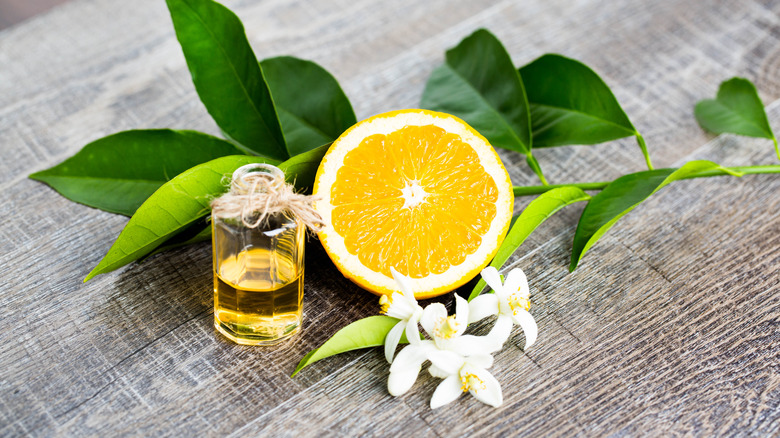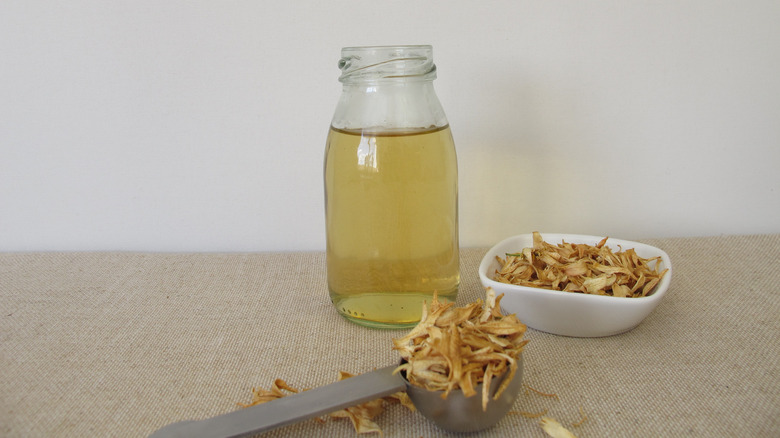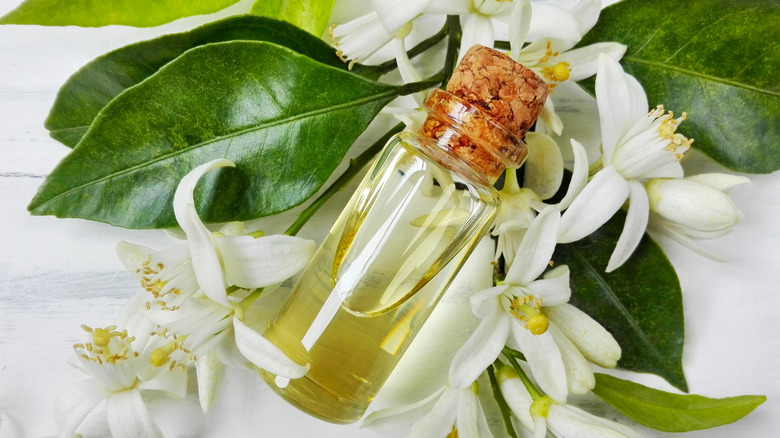Why You Should Always Keep Orange Blossom Water In Your Pantry
VinePair suggests that alchemists began distilling milk in Asia around 800 B.C. The technique made its way across Persia to Egypt, where in the first century C.E., the National Library of Isreal reports, alchemist Maria the Jewess, the mother of modern distillation, perfected the process. Distilling arrived in Greece shortly thereafter to create medicine. Fragrantica reveals that orange blossom water and its stronger counterpart, neroli essence, were distilled from the bitter orange tree as early as 1563 A.D., in what is now Rome, Italy, by the alchemist Giambattista Porta.
Bitter orange, also called the Seville orange, is a special cultivated hybrid of the mandarin orange and the pomelo fruit that grows primarily in the Mediterranean region of Europe and the Middle East. It is prized for its highly aromatic blossoms and fruit, which are crafted into scented water, perfume, and essential oils, for culinary and cosmetic uses. The pure essential oil is quite costly. Orange blossom water is a blend of orange blossom essential oil distillate and water. Martha Stewart indicates that orange blossom water is easy to find at Middle Eastern markets and online so consider keeping a bottle or two in your pantry.
Orange blossom water is essential to Middle Eastern food, North African fare, and Mediterranean dishes. It imparts a delicate yet distinct citrus aroma that has notes of green geranium, wildflower honey, white pepper, tuberose, and fading gardenia. Its beautiful bouquet is a spectacular edition to all of your culinary preparations.
Orange blossom water makes sweet and savory dishes special
Orange blossom water is a frequent ingredient in French, Spanish, Italian, Greek, and Middle Eastern desserts. Try infusing sorbet, crème brûlée, rice pudding, and royal or buttercream icing with a splash of orange blossom water for a quaint touch. Serious Eats says that a little orange blossom water goes a long way. The scent may seem mild, but its effects can be overwhelming when overdone. It is lovely in shortbread and macaroon cookies, angel food cakes, and buttery pastries. Orange blossom water elevates the aromatics of woodsy spices like sumac, cinnamon, clove, and cardamom. It is a wonderful addition to pumpkin pie, spice cake, and fruit cake. Not just for sweets, orange blossom water is delicious in seafood paella, shrimp scampi, Algerian sweet lamb, roast chicken, grilled pork tenderloin glazed with orange sauce, and steamed rice or couscous with raisins and walnuts.
Liven up still or sparkling water with a dash of orange blossom water. It is divine in sparkling wine. Orange blossom water blends beautifully with bourbon and whisky and adds a unique twist to gin martinis. AbsoluteDrinks includes orange blossom water in the gin fizz, the New Orleans fizz, the Chapala, and the Wallick cocktail.
Orange blossom water as a heavenly perfume
Keep orange blossom water in your vanity cabinet too. According to Herb and Root, the Princess of Nerola, Duchess Bracciano Marie Anne de Tremoille, was fond of the scent of orange blossoms and had a distillate created just for her to use in her bathing rituals. She perfumed her gloves with what became neroli. Due to her influence, orange blossom and neroli became one of the most important scents for noble and aristocratic ladies. Additionally, orange blossoms are added to bridal bouquets for luck and fertility, along with their heavenly scent.
Fragrantica states that orange blossom water and neroli essential oil are important and oft-used ingredients in perfume and cosmetics. Orange blossom water is slightly astringent and has long been used to refresh hair and skin and as a perfume for the body and wardrobe. Chill a small glass spray bottle filled with pure orange blossom water and use it to spritz your face during the sweltering summer. It smells divine and feels amazing.


